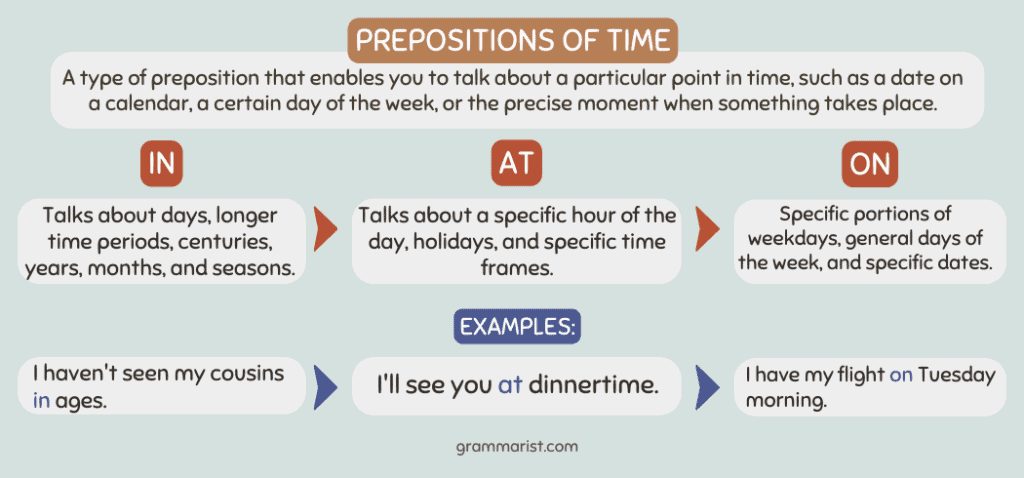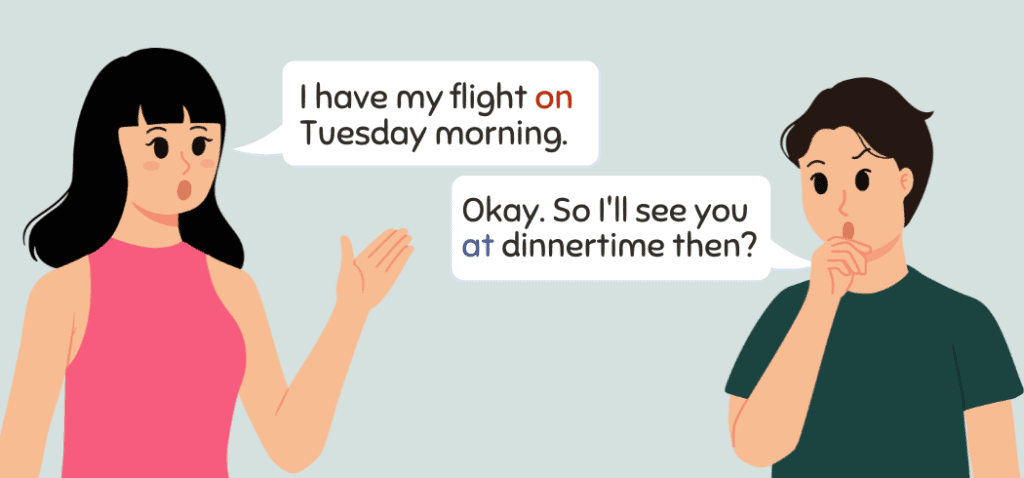English grammar is considered easy to learn, but certain aspects need to be clarified. For example, the words that make up prepositions of time are identical to those that make up prepositions of location. But I’ll break down the differences between them. Let’s dive into some preposition examples and learn how to use them.
What Are Prepositions of Time?

English’s three most commonly used prepositions of time are in, at, and on. “In” is typically used to indicate longer periods or durations in the past or future. “At” generally indicates a specific point in time, such as a particular moment or hour in the present or past. “On” is often used to describe recurring events that happen on certain days of the week, such as “on Mondays.”
3 Common Prepositions of Time
A preposition of time is a type of preposition that enables you to talk about a particular point in time, such as a date on a calendar, a certain day of the week, or the precise moment when something takes place.
The words that make up prepositions of time are identical to those that make up prepositions of location; nevertheless, their usage is distinct.
These prepositions are simple to differentiate from one another because they usually talk about times rather than places. English’s three most commonly used prepositions of time are in, at, and on.
- “In” is typically used to indicate longer periods or durations in the past or future. For example, in might be used to talk about a specific year in history or in a particular season in the future, such as in 2020 and in winter.
- “At” generally indicates a specific point in time, such as a particular moment or hour in the present or past, such as at 10 o’clock and at midnight.
- “On” is often used to describe recurring events that happen on certain days of the week, such as on Sundays and on my birthday.
When choosing between these prepositions of time, it is important to consider both your intended meaning and the context in which you use them. Generally speaking, “in” should be reserved for longer periods of time in both the past and future, while “at” and “on” can be used interchangeably concerning more specific points in time in both the present and past.
The list of prepositions of time is very short, as it only includes “in,” “at,” and “on.”
When to Use Prepositions of Time
There are specific scenarios for using each of the three prepositions of time.
We use “at” when talking about a specific hour of the day, holidays, and specific time frames.
“In” is commonly used when we talk about days, longer time periods, centuries, years, months, and seasons.
“On” is all specific portions of weekdays, general days of the week, specific dates, and dates labeled as specials (like Easter or Christmas).
Examples of Prepositions of Time in a Sentence

Here are some prepositions of time sentences:
- There was a lot of scientific progress in the 19th century.
- I’ll see you at dinnertime.
- I was planning to throw a party on my birthday.
- I have my flight on Tuesday morning.
- Sarah was supposed to meet me here at 10:30.
- I haven’t seen my cousins in ages.
- They were hoping to go to a party on New Year’s Eve.
- I had my last visit to the UK on March 18, 2015.
Do Not Use In/At/On Before “Next” or “Last”
This is an important rule to remember if you want to use prepositions of time.
Here are some examples:
- Correct: I went to visit my grandparents last Christmas.
- Incorrect: I went to visit my grandparents on last Christmas.
- Correct: My parents planned a ski trip next December.
- Incorrect: My parents planned a ski trip on next December.
Prepositions With Parts of the Day
When referring to specific parts of the day, we typically use the preposition “at.”
For example:
- At noon
- At night
- At 12 pm
- At lunch
On Christmas vs. At Christmas
Many people use the expressions “on Christmas” and “at Christmas,” but only one is correct. Since “on” is used to talk about specific dates, saying “on Christmas” refers to something that happens specifically on December 25th. An even better way to phrase it is “on Christmas day.”
We use “at Christmas” when talking about something that happened or is going to happen during the holidays. It refers to a more extended period.
No Prepositions With Tomorrow, Yesterday, Next, and Last
There are certain nouns/adverbs that do not warrant a preposition of time. These include:
- Yesterday
- Today
- Tomorrow
- Every day
- Next week
- Next year
- Next month
- Last week
- Last year
- Last month
- This morning
Final Thoughts
Prepositions of time are used to talk about a specific point, such as a date, day, or moment. We use them in writing but also in speech. The three most commonly used prepositions of time in English are “in,” “at,” and “on.” When choosing among these prepositions of time, it is important to consider both your intended meaning and the context in which you use them.
There are specific scenarios for using each of the three prepositions of time: we use “at” when talking about a specific hour or holiday; “in” when talking about general day times or longer periods; “on” when referring to days of the week, dates, or special occasions.